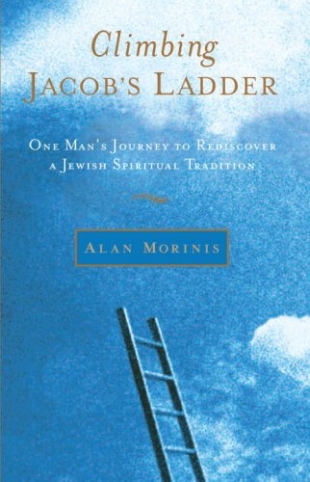"Ours was a thoroughly Jewish home, although it was a Judaism defined more by gefilte fish and Milton Berle than by the Torah and the Talmud," writes Alan Morinis in the opening pages of this incredibly rich and value-laden spiritual memoir. The author, who lives in Vancouver, B.C., attended Oxford on a Rhodes Scholarship where he studied Hinduism, eventually publishing research on pilgrimage in this religious tradition. After 15 busy and exciting years in the entertainment industry as a producer of award-winning feature films, documentaries, and television programs, Morinis felt depleted and burnt-out. In his search for meaning he stumbled across the Mussar movement, a path of spiritual practice developed within the Orthodox Jewish tradition over the last 1,000 years. The two major texts are The Duties of the Heart and The Path of the Just.
In his thumbnail description of Mussar, Morinis writes: "It tells us that at our core we are all holy, and it show us ways to change those qualities within us that obstruct the light of our holiness from shining through. It assures us that we are not condemned to live forever with every aspect of the personality we happen to have right now, but that we can make the changes that will set free the radiance of our inner light. And it provides a tool-bag of personal, introspective, and transformative practices that will lead us, step by step, along the path of purification and change."
The author is so attracted to this spiritual path that he finds a teacher, Rabbi Yechiel Yitzchok Perr, head of a yeshiva in Far Rockaway, New York, who is one of the two living descendants of Mussar's founder -- a Lithuanian rabbi named Israel Salanter. Unable to accept the rigors of Orthodox tradition and practice, Morinis is gratified to discover that Mussar could be learned as a discipline without taking on the culture that had birthed and sustained it.
Many of the conversations the author had with Rabbi Perr over the course of a three-year study are presented in this volume. One of the many things Morinis finds appealing in Mussar is its emphasis upon practical everyday spirituality. Everything we do is part and parcel of "the soul work which will help make us complete." Or as Rabbi Perr puts it, the goal here is mensch-making, becoming all we were meant to be as well-rounded and honorable individuals.
Climbing Jacob's Ladder contains a plethora of practices for those on a spiritual path: meditations to develop concentration and a clear mind, reciting holy phrases "with lips aflame," examining the choices we make, practicing right speech, and removing the obstacles that obstruct the flow of love. We were especially impressed with the Mussar program of working at improving 13 soul traits over the course of a year. That gives four weeks to do inner work and rigorous practices to improve your equanimity, followed by four weeks on kindness, and on and on. This "accounting of the soul," as it is called, could be done by anyone from any religious tradition that emphasizes correcting imbalances and deep transformation.
